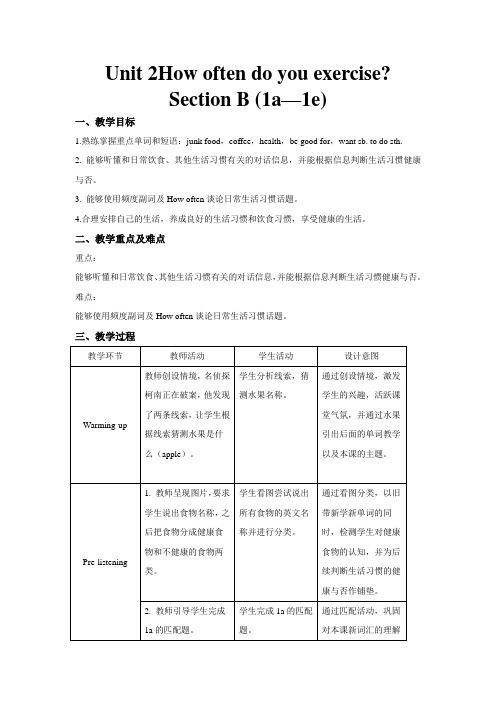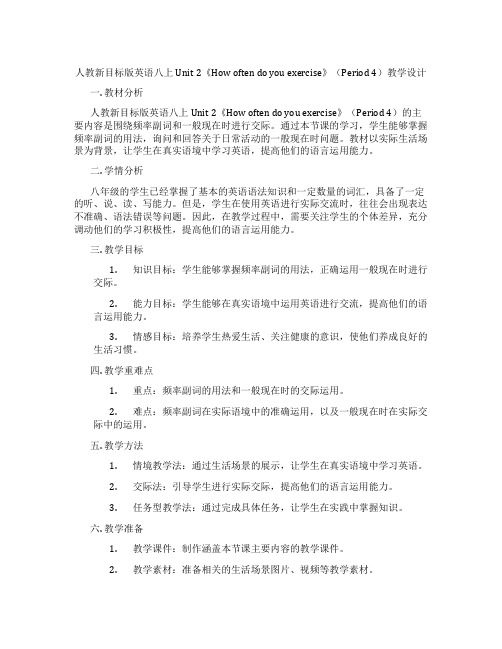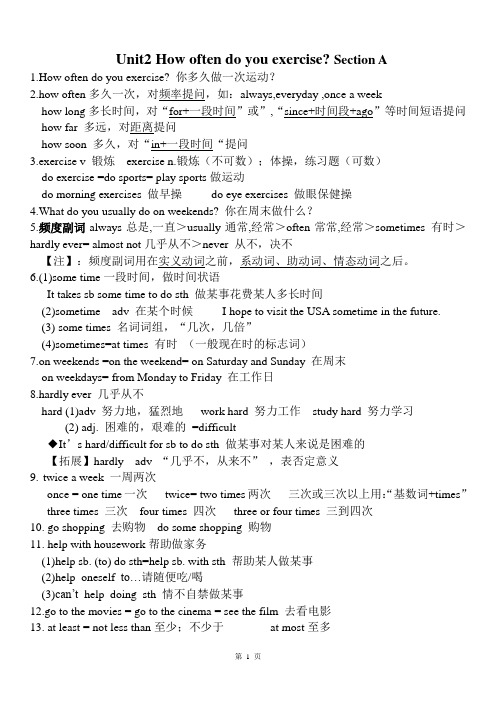人教版英语八年级上册Unit 2 How often do you exercise
人教新目标版英语八上Unit2《Howoftendoyouexercise》(Period1)说课稿

人教新目标版英语八上Unit 2《How often do you exercise》(Period 1)说课稿一. 教材分析人教新目标版英语八上Unit 2《How often do you exercise》(Period 1)的主要内容是围绕频率副词和一般现在时进行学习和交流。
本节课的主要目的是让学生能够熟练运用频率副词和一般现在时进行日常交流,同时提高他们的听说读写能力。
本节课的主要内容包括三个部分:课文阅读,听力练习和口语练习。
课文阅读部分主要介绍了频率副词和一般现在时的基本用法,听力练习部分通过听对话来提高学生的听力理解能力,口语练习部分通过角色扮演和小组讨论来提高学生的口语表达能力。
二. 学情分析根据我对所教班级学生的了解,他们的英语水平普遍较好,对于频率副词和一般现在时的基本用法已经有了一定的了解。
但是,他们在口语表达和听力理解方面还存在一些问题。
因此,在教学过程中,我需要注重培养他们的口语表达能力和听力理解能力。
三. 说教学目标根据教材内容和学情分析,本节课的教学目标如下:1.能够熟练运用频率副词和一般现在时进行日常交流。
2.提高学生的听说读写能力,尤其是口语表达能力和听力理解能力。
3.培养学生的团队合作意识和跨文化交际能力。
四. 说教学重难点本节课的教学重难点如下:1.频率副词的运用。
2.一般现在时的构成和用法。
3.听力理解能力的提高。
4.口语表达能力的培养。
五. 说教学方法与手段为了达到本节课的教学目标,我采用了以下教学方法和手段:1.任务型教学法:通过设计各种任务,让学生在实践中学习和运用语言。
2.交际法:通过模拟真实场景,让学生在交流中学习和提高语言能力。
3.听力教学法:通过听力练习,提高学生的听力理解能力。
4.信息技术辅助教学:利用多媒体课件和网络资源,提高课堂教学效果。
六. 说教学过程本节课的教学过程分为以下几个环节:1.导入:通过播放一段关于运动的视频,引起学生的兴趣,并导入本节课的主题。
人教版英语八年级上册Unit2Howoftendoyouexercise大单元优秀教学案例

2.问题导向的探究式学习
本案例以问题导向为核心,引导学生主动探究、思考。通过设计一系列具有挑战性和趣味性的问题,激发学生的好奇心,培养他们的思维能力。在这种探究式学习过程中,学生不仅掌握了英语知识,还学会了如何用英语进行思考和表达,提高了他们的英语素养。
(二)问题导向
问题导向是本章节教学的重要策略。我将围绕单元主题,设计一系列有趣且具有挑战性的问题,引导学生进行思考、讨论和探究。例如:“How often do you exercise? Why is it importantto exercise regularly? What are the benefits of exercising?”等问题,激发学生的好奇心,培养他们主动探究问题的能力。
(三)学生小组讨论
在学生小组讨论环节,我会将学生分成若干小组,每组根据教师提供的问题或任务进行讨论。例如,我可能会给出以下问题:“What sports do you like to play? How often do you exercise? Can you talk about the benefits of exercising?”等。学生可以结合自己的实际经历和观察,用英语进行讨论。在此过程中,我会在各组之间巡回指导,关注学生的语言运用,并及时提供帮助。
在评价过程中,关注学生的全面发展,不仅关注他们的英语知识掌握程度,还要关注其情感态度、合作精神、创新意识等方面。通过鼓励性、指导性的评价,帮助学生建立自信,激发他们进一步学习英语的积极性。
人教版英语八年级上册 Unit 2 How often do you exercise

Unit 2How often do you exercise?
Section B (1a—1e)
一、教学目标
1.熟练掌握重点单词和短语:junk food,coffee,health,be good for,want sb. to do sth.
2. 能够听懂和日常饮食、其他生活习惯有关的对话信息,并能根据信息判断生活习惯健康与否。
3. 能够使用频度副词及How often谈论日常生活习惯话题。
4.合理安排自己的生活,养成良好的生活习惯和饮食习惯,享受健康的生活。
二、教学重点及难点
重点:
能够听懂和日常饮食、其他生活习惯有关的对话信息,并能根据信息判断生活习惯健康与否。
难点:
能够使用频度副词及How often谈论日常生活习惯话题。
三、教学过程
四、板书设计
Unit 2How often do you exercise?
Section B (1a—1e)
Words and phrases:junk food,coffee,health,be good for,want sb. to do sth. How to keep healthy:
A good eating habit.
Exercise often.
Get enough sleep.。
初中英语人教版八年级上册《Unit 2 How often do you exercise》课件

How often do you watch TV?
多长时间看一次电视 Twice a week. 一个星期两次
How often do you play computer games ?
多长玩次电脑? Every day. 每天
• every day / night • once a week / month • twice a week / month • three times a week / month • once or twice a week / month
Presentation
--What does she usually do on weekends? --She often __e_xe_r_c_i_se_s.
Presentation
--What does he usually do on weekends? --He usually __r_e_a_d_s_b_o_o_k.s
once a week
c. shop
twice a week
d. exercise e. read
three times a week once a month
twice a month
2c How often do you do these activities? Fill in the chart
1a Look at the picture. Make a list of the weekend activities.
1. _h_e_lp__w_i_t_h_h_o_u_s_e_w__o_rk__ 2. _w__a_tc_h__T_V__ 3. _r_e_a_d_a__b_o_o_k__ 4. _e_x_e_r_ci_s_e_____ 5.g_o_s_h_o_p__p_in_g___
人教新目标版英语八上Unit 2《How often do you exercise》(Period

人教新目标版英语八上Unit 2《How often do you exercise》(Period 4)教学设计一. 教材分析人教新目标版英语八上Unit 2《How often do you exercise》(Period 4)的主要内容是围绕频率副词和一般现在时进行交际。
通过本节课的学习,学生能够掌握频率副词的用法,询问和回答关于日常活动的一般现在时问题。
教材以实际生活场景为背景,让学生在真实语境中学习英语,提高他们的语言运用能力。
二. 学情分析八年级的学生已经掌握了基本的英语语法知识和一定数量的词汇,具备了一定的听、说、读、写能力。
但是,学生在使用英语进行实际交流时,往往会出现表达不准确、语法错误等问题。
因此,在教学过程中,需要关注学生的个体差异,充分调动他们的学习积极性,提高他们的语言运用能力。
三. 教学目标1.知识目标:学生能够掌握频率副词的用法,正确运用一般现在时进行交际。
2.能力目标:学生能够在真实语境中运用英语进行交流,提高他们的语言运用能力。
3.情感目标:培养学生热爱生活、关注健康的意识,使他们养成良好的生活习惯。
四. 教学重难点1.重点:频率副词的用法和一般现在时的交际运用。
2.难点:频率副词在实际语境中的准确运用,以及一般现在时在实际交际中的运用。
五. 教学方法1.情境教学法:通过生活场景的展示,让学生在真实语境中学习英语。
2.交际法:引导学生进行实际交际,提高他们的语言运用能力。
3.任务型教学法:通过完成具体任务,让学生在实践中掌握知识。
六. 教学准备1.教学课件:制作涵盖本节课主要内容的教学课件。
2.教学素材:准备相关的生活场景图片、视频等教学素材。
3.作业布置:提前为学生布置相关的预习作业。
七. 教学过程1.导入(5分钟)利用图片或视频展示一些运动场景,引导学生谈论日常生活中喜欢的运动。
教师提问:“What sports do you like?”,学生回答:“I like playing basketball.”等。
人教版八年级上册英语Unit2How often do you exercise知识点

Unit2 How often do you exercise? Section A1.How often do you exercise? 你多久做一次运动?2.how often多久一次,对频率提问,如:always,everyday ,once a weekhow long多长时间,对“for+一段时间”或”,“since+时间段+ago”等时间短语提问how far 多远,对距离提问how soon 多久,对“in+一段时间“提问3.exercise v 锻炼exercise n.锻炼(不可数);体操,练习题(可数)do exercise =do sports= play sports做运动do morning exercises 做早操do eye exercises 做眼保健操4.What do you usually do on weekends? 你在周末做什么?5.频度副词always总是,一直>usually通常,经常>often常常,经常>sometimes 有时>hardly ever= almost not几乎从不>never 从不,决不【注】:频度副词用在实义动词之前,系动词、助动词、情态动词之后。
6.(1)some time一段时间,做时间状语It takes sb some time to do sth 做某事花费某人多长时间(2)sometime adv 在某个时候I hope to visit the USA sometime in the future.(3) some times 名词词组,“几次,几倍”(4)sometimes=at times 有时(一般现在时的标志词)7.on weekends =on the weekend= on Saturday and Sunday 在周末on weekdays= from Monday to Friday 在工作日8.hardly ever 几乎从不hard (1)adv 努力地,猛烈地work hard 努力工作study hard 努力学习(2) adj. 困难的,艰难的=difficult◆It’s hard/difficult for sb to do sth 做某事对某人来说是困难的【拓展】hardly adv “几乎不,从来不”,表否定意义9.twice a week 一周两次once = one time一次twice= two times两次三次或三次以上用:“基数词+times”three times 三次four times 四次three or four times 三到四次10.go shopping 去购物do some shopping 购物11.help with housework帮助做家务(1)help sb. (to) do sth=help sb. with sth 帮助某人做某事(2)help oneself to…请随便吃/喝(3)can’t help doing sth 情不自禁做某事12.go to the movies = go to the cinema = see the film 去看电影13. at least = not less than至少;不少于at most至多14. use the Internet 上网15.What’s your favorite program?=What program do you like best?你最喜欢的节目是什么?16.every day 每天= each day 做状语,放在句末,对其提问用how ofteneveryday = daily adj. 每天的,作定语,修饰名词,放在名词之前He exercises every day. 他每天都锻炼。
人教版八年级上册Unit 2 How often do you exercise? 语法知识突破
人教版八年级上册Unit 2 How often do you exercise?语法知识突破人教版英语八年级上册第二单元Unit 2 How often do you exercise 语法知识突破在英语学习中,语法学习,既是一个重点,也是一个难点,每个单元的设计都是围绕一定话题,突破语法和句子知识展开的。
接下来,我们来呈现一下人教版英语八年级上册第二单元的语法如何突破?从标题看语法本单元的标题是:How often do you exercise 从标题可以看出,本单元主要谈论“频率”问题,所以,话题就是“关于日常活动的频率”,既然是询问频率,就牵涉到关于如何询问频率?如何表达频率?等一系列的问题。
语法突破:如何询问频率?英语里面,当我们要询问对方“多久做一次某事”的时候,要用“how often”来询问频率,表示“多久一次”,例如:How often do you exercise 你多久锻炼一次?How often do they go out for a picnic 他们多久出去野炊一次?从Grammar focus看语法。
语法部分从基本句型”What do you usually do “引入,通过回答,给我们展示了频率副词always , often, sometimes等的用法。
接下来,用How often do you go to the movies 再次引出频率副词的用法以及如何表示“次数”。
让我们先看语法中的句子。
What do you usually do on weekends I always exercise.What do they do on weekends They often help with housework.What does she do on weekends She sometimes goes shopping.How often do you go to the movies I go to the movies maybe once a month.How often does he watch TV He hardly ever watches TV.Do you go shopping No , I never go shopping.当询问某人周末通常做什么的时候,用到频率副词usually,它的位置“be动词的后面,行为动词的前面”。
初中英语八年级上册Unit 2 How often do you exercise课件
1.Jack sleeps just 6 hours every day. 2.He eats junk food very often, and he never drinks milk. 3.He hardly ever exercises.
How to keep healthy?
Eat healthy food. Exercise often. Have lots of sleep. Be happy. Help others. …
人教新目标版 八年级上
Unit 2 How often do you exercise?
Section B 2a-2e 阅读课
Lead in
1.Lisa sleeps eight hours every night. 2.She eats a good breakfast and she exercises every day. 3.She never eats junk food.
The answers to our questions about watching television were also interesting. Only two percent of the students watch TV one to three times a week. Thirteen percent watch TV four to six times a week. And eighty-five percent watch TV every day! Although many students like to watch sports, game shows are the most popular. It is good to relax by using the Internet or watching game shows, but we think the best way to relax is through exercise. It is healthy for the mind and the body. Exercise such as playing sports is fun, and you can spend time with your friends and family as you play together. And remember, “old habits die hard”. So start exercising before it’s too late!
人教新目标版英语八上Unit 2《How often do you exercise》(Period
人教新目标版英语八上Unit 2《How often do you exercise》(Period 5)教学设计一. 教材分析人教新目标版英语八上Unit 2《How often do you exercise》(Period 5)的主要内容是围绕频率副词进行问答,学会用英语询问别人的锻炼习惯,并能够用恰当的频率副词回答。
本节课的主要目标是让学生掌握频率副词的用法,以及如何用英语询问和描述别人的锻炼习惯。
二. 学情分析学生在学习本节课之前,已经掌握了基本的日常交际用语,能够进行简单的自我介绍和询问他人信息。
但是,对于频率副词的用法以及如何用英语询问和描述别人的锻炼习惯还不够熟练。
因此,在教学过程中,需要注重频率副词的讲解和练习,以及锻炼习惯的描述。
三. 教学目标1.能够听懂、会说、会读频率副词:always, usually, often, sometimes,rarely, never。
2.能够用英语询问别人的锻炼习惯,并能用恰当的频率副词回答。
3.能够描述自己的锻炼习惯,并能够询问他人的锻炼习惯。
四. 教学重难点1.频率副词的用法。
2.如何用英语询问和描述别人的锻炼习惯。
五. 教学方法1.交际法:通过模拟真实场景,让学生在实际语境中学习和使用频率副词和锻炼相关的词汇。
2.任务型教学法:通过完成各种任务,让学生在实践中学习和运用英语。
3.小组合作学习:通过小组讨论和互动,提高学生的参与度和积极性。
六. 教学准备1.教学PPT:包括频率副词的图片、例句、练习题等。
2.练习册:配合PPT进行练习。
3.教学录音机:用于播放听力材料。
4.教学视频:用于播放相关场景的视频。
七. 教学过程1.导入(5分钟)通过播放一段关于人们锻炼的视频,引导学生谈论人们的锻炼习惯。
教师提问:“How often do you exercise?”,让学生用中文回答,同时板书频率副词:always, usually, often, sometimes, rarely, never。
2017人教新目标版英语八上Unit 2《How often do you exercis
Does Tina have good habits?
Yes. No. I don’t know.
Does Bill have good habits?
Yes. No. I don’t know.
1d Listen again. Fill in the blanks in the survey.
热狗对我们的健康有坏处。
1a. Match the words with the pictures.
a
b
c
d
e
f
Check the answers!
1. __b__ junk food 4. ____c_ vegetables
2. ___a__ milk
5. ____f_ sleep
3. ___e__ fruit 6. ____d_ coffee
nine
4.How often do you drink milk? 5.How often do you eat junk food? 6.How often do you drink coffee?
every day 2 or 3 times a week never
nine
never 3 or 4 times a week 4 times a day
healthy: unhealthy:
healthy: salad, soup, broccoli, milk , dumpling, onion, mushroom, milk, fruit, vegetables unhealthy:
cola, hot dog, potato chips, fried chicken, hamburger, junk food, coffee, chocolate
- 1、下载文档前请自行甄别文档内容的完整性,平台不提供额外的编辑、内容补充、找答案等附加服务。
- 2、"仅部分预览"的文档,不可在线预览部分如存在完整性等问题,可反馈申请退款(可完整预览的文档不适用该条件!)。
- 3、如文档侵犯您的权益,请联系客服反馈,我们会尽快为您处理(人工客服工作时间:9:00-18:30)。
初中英语学习材料madeofjingetiejiUnit 2 How often do you exercise?Part 1 TextbookWhat do No. 5 High school students do in their free time?Last month (我们问了一些同学关于他们的自由活动). Our questions were about exercise, (上网)and watching TV. Here are the results. We found that (只有15%的同学每天锻炼). 45 percent exercise (一周4-6次). 20 percent exercise only one to three times a week .And 20 percent (从不锻炼)We all know that many students often go online, (但是令我们吃惊的是90%的人每天上网). The other 10% use it at least three or four times a week. Most students use it (取乐而不是为了家庭作业)The answers to our questions about watching television were also interesting. Only 2% of the students watch TV one to three times a week. 13% watch TV four to six times. And 85% watch TV every day! (尽管)many students like to watch sports, games shows are the most popular.(通过上网放松时非常好的)or watching game shows, but we think (最好的方式) to relax is through exercise. It is healthy for the mind and the body. (像做运动这样的锻炼时非常有趣的), and you can spend time with your friends and family as you play together. And remember, “old habits die hard”. (所以趁早开始锻炼吧)!Part 2 Words and Phrases一、把下面的短语翻译成英文1. 帮助做家务2.几乎不3.在周末4.进行体育锻炼5.每同一次6.至少一月两次7.一年三次8.上网9.去看电影10.多久一次11.最喜爱的电影12.动物世界13.下周14.有空15.对某人来说已满16.装满了……17.上舞蹈和钢琴课18.什么种类的舞蹈19.摇摆舞20.不得不打网球21.早早上床睡觉22.一顿健康的早餐23.熬夜到很晚24.放学后25.对……有好\坏处26.想要某人做……27.有好\坏的饮食习惯28.多少小时29.垃圾食品30.在乡村野营31.问某人关于某事32.空闲时间活动33.因特网的使用34.仅仅百分之一十五的……35.根本不36.没关系37.另外的百分之十38.为娱乐而用,不是为家庭作业而用39.我们的问题的答案40.游戏节目41.最受欢迎的42.通过使用因特网43.诸如……44.开始做……45.不要等到太迟。
\未为晚矣46.看电视超过2小时47.去看牙医48.一个16岁的高中学生49.牙齿的清洁50.几乎每天51.一年几次52.购物中心53.以……开始54.我不能忍受牛奶55.下面就是结果二、选择短语并用正确的形式填空help with once a week at least be free stay up late start with use of the Internet1. I am going to to finish my paper.2. We need 24 hours’ notice of cancellation.3. Surely you need some h so much work.4. The goal of your is exchanging messages or obtaining information.5. We’ll a bit of dancing to get the adrenaline going.6. She instructs music at a middle school.7. I’m afraid I won’t until 7 o’clock.三、根据句意和首字母填空1. ---How o__________ does your mother shop?---Twice a week.2. I also like English. But math is his f____________ subject.3. Some children often surf the I_______________ with the help of their parents.4. We u_____________ play soccer on weekdays.5. His father d__________ in a car accident.6. Do you know the r________ of the football match?7. M_________ he knows the answer.8. Her uncle n___________ watches football match. He doesn’t like football a t all.9. ---What is your favorite TV p_________?---Sports news.10. ---How many t__________ did you go to Beijing?---Only once.Part3 Sentences一、句型转换1. Mr. Zhang taught him English two years ago. ( 改为一般疑问句 )2. Lucy put her books on the desk. (对划线部分提问)3. You’d better not ask your father t his question. (改为同义句)4. Mike likes playing football very much.(改为否定句)5. He goes to the park three times a week. (对划线部分提问)二、翻译句子1. 我们发现大部分学生一个星期看两三次电视.2. 至于家务,我母亲做了大部分,我几乎不做,我主要是读书3. 她从不锻炼,所以她很胖,没有很好地保持健康4. 我们都知道很多学生经常上网,我们很吃惊他们中有百分之九十的人每天上网。
5. 对思想和身体都很健康。
6. 我们去滑冰吧,滑冰对我们的身体有益Part 4 Language Points一、选择填空1. _____more fruits and vegetables is good _____ our health.A. Eating; toB. Eats; forC. Eating; forD. Eat; for2. ---How_____ do you read English?---Sometimes.A. longB. oftenC. farD. much3. A lot of vegetables ___you to keep in good health.A. makeB. wantC. tryD. help4. Peter is _____because he hardly ever exercises.A. tiredB. happyC. healthyD. unhealthy5. He knows a lot ______he is still a child.A. soB. althoughC. butD. or6. My dad ______a lawyer when I grow up.A. wants me toB. wants me to beC. becameD. wanted7. My mother________ surfs the Internet, she likes watching TV.A. doesn’t hardly everB. hardly everC. isn’t hardly everD. hardly never8. --- ______does he do on the weekend?--- He often helps his mother with housework..A. HowB. How oftenC. WhatD. How soon9. --- What_____ you usually _____on weekends?---I usually ______ violin.A. did; do; play theB. do; do; playC. do; did; playD. do; do; play the10. ---Are you late for class?---_______.A. Yes, neverB. Yes, sometimesC. No, everD. No, usually11. ____he was tired, ______he didn’t stop ______.A. Although, but; to restB. Though; / ; workingC. Although; / ; restingD. though; but; working12. Your lifestyle is the same _____ .A. to my brotherB. to mineC. as mineD. as my brother13. Can you help me ______the house?A. cleaningB. with cleanC. of cleaningD. clean14. Li Ming was born_____ May 11, 1989 _____Guangzhou.A. in; onB. on; inC. in; atD. at; in15. She always finishes her homework on time. She __ leaves it for tomorrow.A. alwaysB. neverC. usuallyD. sometimes16. Tony, pass my glass to me, please. I can _____ read the words in the newspapers.A. clearlyB. ratherC. hardlyD. eve17. ---Your spoken English is much better.--- ________.A. Yes, please.B. Thank youC. You are right. D .Not at all18. Lisa ____eight hours every night. What about you?A. eatsB. drinksC. playsD. sleeps19. I ______ see her in the supermarket.A. sometimeB. some time C sometimes D. some times20. The doctor tells me I should eat ___ meat and take ____exercise.A. a little, a fewB. less, moreC. many, muchD. much, manyPart5 Conversation一、完成对话,在对话空格中填上适当的单词,使对话完整正确。
